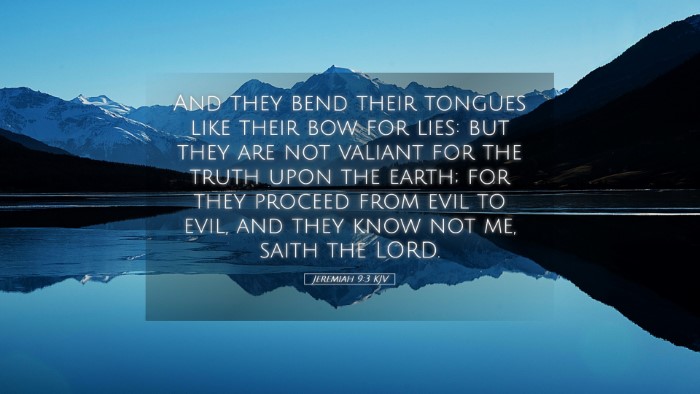Commentary on Jeremiah 9:3
Text of Jeremiah 9:3 (ESV): "They bend their tongue like a bow; falsehood and not truth has grown strong in the land; for they proceed from evil to evil, and they do not know me, declares the Lord."
Introduction
Jeremiah 9:3 stands as a poignant reflection of the moral decline in Judah during the time of the prophet Jeremiah. This verse encapsulates the essence of the spiritual and ethical turmoil faced by the people, where deception had supplanted truth. The following commentary draws from the insights of renowned public domain scholars, providing a comprehensive analysis useful for pastors, students, theologians, and Bible scholars.
Analysis of the Verse
Understanding the Metaphor
"They bend their tongue like a bow;" - This vivid imagery reflects the deceitful speech of the people. Matthew Henry notes that the tongue is the instrument of speech, akin to a bow that can be bent to launch arrows of falsehood. Just as a bow is designed for warfare, so does the tongue wield power, but in this case, it is directed toward the propagation of lies.
Albert Barnes expands on this metaphor by emphasizing that the Jews were skilled in using their language to manipulate, deceive, and betray one another as effectively as a bowman takes aim at his target. The metaphor suggests a deliberate and calculated approach to their deceit, highlighting their moral state.
Falsehood Versus Truth
"Falsehood and not truth has grown strong in the land;" - This phrase underscores the prevailing culture of dishonesty. Adam Clarke interprets this as indicating that deception had not only permeated society but had also become entrenched, suggesting an erosion of moral values. The proliferation of falsehoods reflects the spiritual bankruptcy of the people, as they turn their backs on divine truth.
- Moral Decline: The land is characterized by a lack of integrity, where lies flourish, suggesting a systematic failure of social order.
- Divine Response: This growth of falsehood provokes God's disdain and wrath, as the people forsake their covenant relationship with Him.
From Evil to Evil
"for they proceed from evil to evil;" - The progression of sin is a key theme in this part of the verse. Barnes remarks that the phrase illustrates a downward spiral in their ethical and spiritual conduct. Clarke observes that each evil act leads to further corruption, forming a vicious cycle driven by the absence of acknowledgment of God.
This pattern of sinfulness highlights a collective blindness to their moral state and a move further away from God. The people’s failure to recognize their evil not only damns them but shows how deeply sin has taken root in the community.
Spiritual Blindness
"they do not know me, declares the Lord." - In this conclusion, God reveals the root of their problem: a profound ignorance of Him. Henry explains that knowledge of God is crucial to understanding truth. The rejection of divine wisdom leads to ethical decay. The leaders and people alike had forsaken their knowledge of God, which blinded them to their sin.
- Consequences of Ignorance: The disregard for God's presence and guidance fosters an environment where lies become the norm.
- Call to Awareness: There is an implicit call for the people to repent and seek a relationship with God to restore truth in their lives.
Theological Implications
The implications of Jeremiah 9:3 are vast, reaching into the heart of human nature and our relationship with the divine. This verse serves as a warning and an examination of our own hearts in light of integrity and truth in society.
- The Nature of Sin: Sin leads to a breakdown in communication—with God, with each other, and within ourselves. The consequences are not merely personal but societal, affecting communal ethics.
- The Need for Divine Revelation: As believers, understanding God’s holiness and truth is vital to combating the evils of our time. Without knowing God, we cannot discern right from wrong.
Conclusion
Jeremiah 9:3 offers a timeless message about the dangers of a society steeped in falsehood and the consequences of turning away from the knowledge of God. It serves as a poignant reminder for modern readers to evaluate the integrity of their own words and actions in light of the truth of God's Word. Pastors, students, and scholars alike should reflect on how this scriptural admonition can inform and transform their approach to ministry, study, and daily living.
Reflection Questions
- In what ways does the metaphor of the tongue as a bow resonate with modern communication?
- How can we as a community cultivate a culture of truth in a world rife with lies?
- What steps can be taken to deepen our knowledge of God to combat spiritual blindness?


